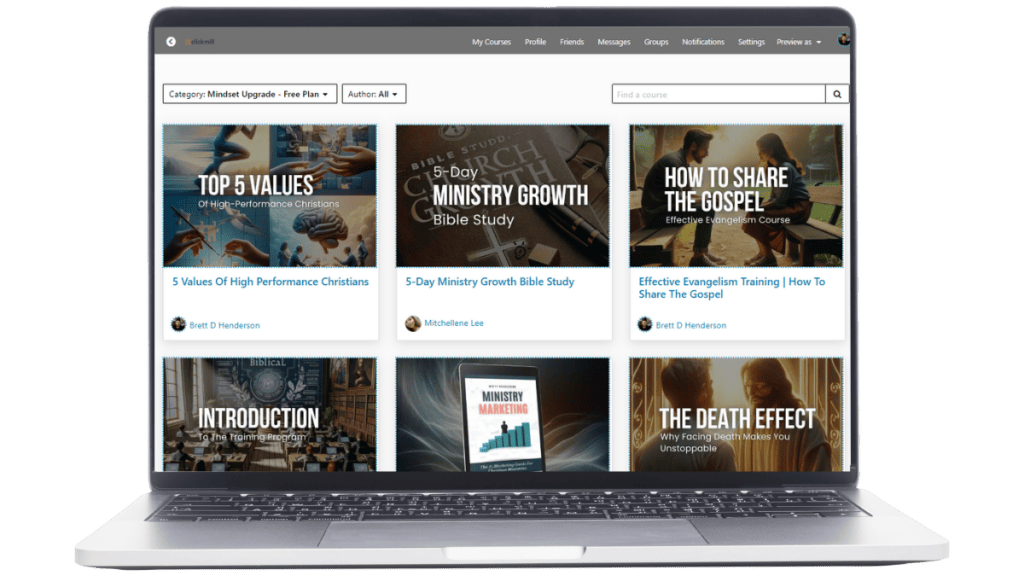Those struggling with pastor burnout feel that they have lost the passion that once drove them into ministry. You may feel hopeless, trapped, or completely defeated. Your motivation for doing what you love has dried up and you no longer find much satisfaction in ministry.
If this sounds like you, you are exactly where you need to be. In this guide to burnout in ministry, we are going to cover everything you need to know about how to beat ministry burnout for good!
Let’s get into it.
My Journey Through Pastor Burnout
If you want to get to the meat of the article, you can skip over this section about me.
After ministry school, I accepted a Youth Ministry Director position with a Christian church. Within three years of beginning in ministry, I had lost all the excitement and passion that I had originally felt when I was called into ministry.
Like you, I went into ministry with a passion to help others, to share the Gospel, and disciple those who already knew God. I wanted to build the kingdom and through a series of unexplainable events, I found myself overwhelmed, anxious, having trouble sleeping, and frequently felt anxious and impatient. I felt my productivity was declining and to my own surprise, I felt dread doing what I loved most.

Since then, God has taken me on a journey of discovery to discover the causes and solutions of the biggest problems I faced in ministry that so many other pastors face too.
After ten years of searching for the solutions to these questions, I now run a church marketing and consulting firm where I get to encourage ministry leaders like you on how to overcome ministry burnout and many other church growth-related problems.
Despite your present circumstances, God has a powerful, fulfilling ministry in store for you. If that sound like what you want, I’m going to share a perspective on how to identify & end ministry burnout FOREVER.
If you are considering working with a church consultant, you will love this post titled: How To Hire Your Ideal Church Consultant.
Get 20+ online christian business training courses Free For 1 Month!
Grow A God Honoring Business With 20+ Courses, Weekly Live Coaching Calls, Live Group Chat, & More! Get Your First Month For FREE!

The Founder Of Clickmill Teaches You How To Find Biblical Success In Business.
What Is Pastor Burnout?
I’m going to define ministry burnout and I want you to read it twice. If you can really get this, you will be able to solve your ministry burnout.
Pastor Burnout: Ministry burnout is exhaustion that comes as the result of expending more personal resources than you have to spend.
You’re Personal Resources are time, energy, effort, attention, decision-making, and finances. When we consistently allocate these limited resources to the wrong things at the wrong times, we realize we have none left when we need them most. But more on this later on.

This is what I call Pastoral Resource Debt. Remember that time you overspent your credit card and then had to deal with the consequences of paying it back? That’s what’s happening with your whole life.
Pastor burnout is what happens when the bill comes due. Before we get to the solution to pastor burnout, let’s look at some of the symptoms of ministry burnout.
Symptoms Of Pastor Burnout

If you are struggling with ministry burnout, you may be feeling symptoms like:
Physical Signs & Symptoms:
-You feel tired much of the time
-You get sick more often than you used to
-You experience somatic symptoms of stress like headaches, migraines, muscle aches, etc
-Irregular appetite
-Irregular sleep schedule or insomnia (difficulty sleeping)
-Feeling the inability to manage daily life
Emotional Signs & Symptoms:
-Feeling apathy or numbness.
-Feeling controlled in the workplace.
-Loss of motivation to engage in normal activities.
-Feelings of negativity toward things you previously loved
-Decreased job satisfaction
-Feeling trapped or defeated by your ministry
-Feeling of increasing self-doubt
Behavioral Signs & Symptoms:
-Consideration of leaving the ministry
-Self-isolation, withdrawal, or pushing others away
-Engaging in toxic coping strategies like drugs, alcohol, or some other method of letting off excess stress
-Abnormal expressions of frustration
-Lack of patience with others
Toxic Stress Vs. Pastor Burnout
Stress and ministry burnout are often related to one another but are not the same thing.
Pastoral stress typically sets in before burnout, and if left unaddressed, leads to burnout in ministry.

Stress is generally characterized by over-functioning. Pastoral stress is what happens when you are the bottleneck in the ministry. For one reason or another, you have not delegated tasks and there is more responsibility than you can keep up with. There are too many events, too many problems to solve, and too much pressure for growth. Volunteers keep cycling out of ministry (because they too are burning out) leaving you with even more to do than before. Most ministry leaders usually try to solve this problem by doing more (over-functioning) to “catch up” but end up in a never-ending hampster wheel of toxic stress. Pastors sinking in this type of stress can only sink for so long until they are buried. That’s when burnout sets in.
It’s not always clear to leaders when burnout in ministry sets in but it is characterized by under-functioning. That light of hope that was off in the distance – it’s gone now. That hope you had to make a difference in the world and to see your audience come to Christ is gone. The passion you felt when you went into ministry is no longer there. You feel like disengaging, changing careers, and you may even feel clinical levels of depression or anxiety.
Get 20+ online christian business training courses Free For 1 Month!
Grow A God Honoring Business With 20+ Courses, Weekly Live Coaching Calls, Live Group Chat, & More! Get Your First Month For FREE!

The Founder Of Clickmill Teaches You How To Find Biblical Success In Business.
How Many Pastors Experience Burnout?
According to Barna (a research firm that specializes in faith and culture), 38% of ministry leaders thought about quitting full-time ministry in 2021. 24% of pastors described themselves as “unhealthy” across a number of questions related to their well-being.
In one survey of pastors, 75% admitted feeling “highly stressed”. Another survey of over 1,000 pastors reported that 100% of pastors had a colleague who left the ministry due to burnout, conflict, or moral failure.

The dismal statistics about pastoral depression and discouragement go on and on, and the truth is clear to see: the way pastors try to maintain a high-performance lifestyle isn’t working.
You are not alone in ministry burnout and you are able to get back to being your normal self with some permanent changes that will help you maintain a healthy life.
Personality Traits Of Pastors That Face Burnout
Pastor burnout is common to all pastors, but ministry burnout is most common with ministry leaders that have a few personality traits.
Those are:
- Perfectionistic Tendencies: Things need to be done a certain way. “If you want it done right do it yourself” is the motto of the perfectionistic pastor. For those perfectionistic ministry leaders who are able to hand off tasks, micromanaging may be an unhealthy follow-up strategy they use to maintain their standards.
- High-Performers: These are people who have the stereotypical A-type personality. God has called these leaders to help implement a powerful vision for the world and they are committed to putting in the effort, even if it means too much effort.
- Anxious: Not only is constant anxiety exhausting in and of itself, but ministry leaders who are anxious often over-function out of some kind of fear so they unintentionally work themselves into burnout mode.
- Enmeshed: Pastors who struggle with enmeshment aren’t able to see the line between their own life and ministry. This leads to working when they should be resting. Hazy boundaries between work and rest are a major cause of pastor burnout.
Why Is There So Much Pastor Burnout?
Broadly speaking, there are essentially two types of people when it comes to their work. There are people who push their limits and people who prefer a less intense work experience. We will call these the High-Perfermers and the 9-5ers. (This is of course a broad generalization and expectations – like pastors – exist.)
The 9-5ers: The 9-5ers like safety and security. They want a house in the suburbs, a dog, a white picket fence, and 1.5 kids. They expect to punch the clock, do an honest day’s work, and go home.
9-5ers expect to do what’s expected & they expect to do a fair amount of work for the pay.

9-5ers are good, honest people who want to live a respectable life but may not think of themselves as a world changers. The 9-5ers are typically employees who have learned one trade or profession and sell this skill to the highest bidder (the employer). 9-5ers may have their limits pushed, but they don’t make it a habit of pushing their own limits.
The High-performers: Then there are those of us who have a screw loose. We are motivated by a vision of a better world. We refuse to accept the status quo. We know the world is supposed to be different and we will do whatever it takes to see that come to fruition. We’re self-starters and we will put in the extra hours and effort.
It’s nice to live a comfortable life but if we had the choice between comfort and fulfilling the vision God has put in our hearts – we would take the struggle any day.
These are the serial entrepreneurs, the CEOs, the Founders, the Authors, etc. The High-Performers are the people who will be the world changers – but only if they can sustain their own high performance over the long haul in a HEALTHY WAY.
Here is the clencher – high-performers know that in order to change the world, they have to produce results, and they often learn many different skill sets to make this happen.
Get 20+ online christian business training courses Free For 1 Month!
Grow A God Honoring Business With 20+ Courses, Weekly Live Coaching Calls, Live Group Chat, & More! Get Your First Month For FREE!

The Founder Of Clickmill Teaches You How To Find Biblical Success In Business.

The Pastors: But where do pastors fit in all this? You sit in an unfortunate in-between. You are a visionary and you are motivated by bringing Christ into the world in some impactful way. You want to reach the world for Christ, you want to storm the gates, and you want to see a growing and thriving ministry. God has put it in your heart to change the world.
But here is where the problem comes in…
Pastors have the vision, passion, and drive of a high-performer but the skillset of a 9-5er.
High-performers know what kind of mess they have gotten themselves into and they have accepted it and have searched high and low for the best strategies they can use to maintain a healthy, high-performance lifestyle. CEOs read an average of 60 books per year for exactly this reason. They understand that to keep up with the demands on them, they have to assess, and reassess every part of their life and schedule to find the next thing that needs to be cut out.
Here are some of the ways pastors differ from many other types of high performers that predispose them to experience burnout at disproportionate rates.

Failure to Optimize: Pastors have been led to think in terms of the 9-5er but discover that in order to move toward their world-changing vision, something else is required. They then inevitably try to “do more” which quickly becomes an unsustainable lifestyle that ends with burnout in ministry.
High-performers optimize their schedule. They figure out what is getting their desired results and they eliminate everything else. This often means that instead of working more, high-performers are exceptionally good at identifying and hitting DELETE on everything that isn’t essential. When done correctly, they can condense their workload down to as little as a few hours per week. This frees them up to do other, more fruitful activities.
Lack of Skills: Ministry school taught you and I how to interpret scripture, and how to speak in front of people… (and college algebra). But it turns out that to be a high performer you need WAY MORE skills than this. Not only this, but pastors often believe it is “unspiritual” to learn many of the skills on the list above. This further limits their ability to function in a high-performance life.

(I got all the way through ministry school and never learned about administrative skills. I was instantly shocked, discouraged, and overwhelmed when I discovered that my week was 80% administrative tasks.)
High performers read on numerous subjects. They also don’t buy into the idea that it only takes one skill to create a growing organization or movement. They take the time to learn as many skills so they are able to tackle problems themselves or guide a team to knowledgeably resolve problems in their place.
Here is a list of a few common skills many high performers intentionally learn so :
- Sales
- Marketing
- Corporate law
- Business
- Strategic Thinking
- Leadership
- The IRS Tax Code
- Accounting
- Book Keeping
- Negotiating
- Healthy communication skills
- Web Design
- Search Engine Optimization
- Lead Generation Strategies
- Economics
- Finance
- Stress Management
- Time Management
- Management
- Psychology
- Etc.
No wonder they are reading 1.25 books per week.
With a wider range of tools to choose from, they experience less stress because they have a wider range of abilities to meet the constantly changing demands the career’s present.

Generalists: High-performers who make it over the long haul are generalists who have some field they specialize in. They aren’t the greatest in the areas they generalize in, but they can still get a result – even if it barely makes the passing grade.
Specialists: 9-5ers are typically hyper-specialized in 1 or 2 skills. This is only practical if there is an entire organization set up to take care of every other skill you WOULD need if you were running the show.
Problem Assessment: Ministry leaders often believe that they should confront every problem with personal sacrifice, prayer, faith, and hope. While these are all good things, it’s clear that there is more we need to know in order to maintain a healthy, high-performance lifestyle.
High-performers do everything they can to learn mental models that help them quickly asses how to handle difficult problems as they arise. High performers are also intimately aware of what resources they have to expend, and where those resources are going on any given day.
Only when you are aware of the resources God has entrusted you with will you be able to better steward where they are going. When you invest your resources into fruitful activities, it won’t be long until you begin seeing a fruitful ministry.
Get 20+ online christian business training courses Free For 1 Month!
Grow A God Honoring Business With 20+ Courses, Weekly Live Coaching Calls, Live Group Chat, & More! Get Your First Month For FREE!

The Founder Of Clickmill Teaches You How To Find Biblical Success In Business.
Why Many Pastor Burnout Strategies Don’t Work
Why don’t the typical pastor burnout strategies work?

Many other resources on pastor burnout make recommendations like these:
- Find a hobby
- Take a sabbatical
- Get “far away friends”
- Go on vacation
- Read more books on [enter Christian subject here]
Suggestions like these don’t help pastor burnout because they don’t address the core issue.
The first four suggestions are nothing more than suggestions on how to temporarily escape from the real issue. You may be able to recharge on a sabbatical or relax while enjoying your favorite hobby, but it doesn’t change the fact that as soon as you go back into the office there is an unsustainable situation waiting for you.
The core of the issue is that pastors are exhausted because they spend more personal resources than they have to spend. Then, when they show up the next day, there are no resources left to use. When this happens consistently over time, one day you realize you feel soul-wrenching exhaustion, dread, and apathy.
To end your pastor burnout for good, you have to deal with the root of the problem
Sacrifice & Pastor Burnout
It’s true that nothing good comes for free.
Even Jesus had to pay a high price for OUR free gift of salvation.
All good things require sacrifice.

If God has called you to be a high performer and given you a world-changing vision, it’s going to require a huge sacrifice. If you are feeling the signs and symptoms of pastor burnout, then you have already begun to make that sacrifice. Unfortunately, you have not yet begun making that sacrifice in a sustainable way.
Some sacrifices are sustainable and some aren’t
“Then he called the crowd to him along with his disciples and said: “Whoever wants to be my disciple must deny themselves and take up their cross and follow me. For whoever wants to save their life will lose it, but whoever loses their life for me and for the gospel will save it. What good is it for someone to gain the whole world, yet forfeit their soul? Or what can anyone give in exchange for their soul?”
The passage above reveals two points about the sacrifice that we should heed as Ministry leaders.
- Good things require sacrifice: The passage above clarifies that in order to save your eternal life, you must sacrifice your worldly life. [We also see in the NT that the disciples were required to leave everything to be discipled by Jesus, the rich young ruler was asked to give away his wealth, and the Pharisees were asked to sacrifice their rigid adherence to the Law for something greater.]
- Some Sacrifices Are Unwise: This passage also reveals that there are greater and lesser sacrifices when it says “What good is it for someone to gain the whole world, yet forfeit their soul”.
Healthy, high-performance leaders understand that they will be required to sacrifice a lot to see their vision come to pass. They also understand that they need to limit their sacrifice at any given time to a sustainable level or they will collapse in on themselves like a dying star.

It takes a long time to reach a big vision and when high-performers sacrifice toward that vision too quickly, they face burnout in ministry.
What good is it to overperform in ministry in the short run if you lose your entire ministry in the long run?
The goal is to perform as closely as you can to your maximum sustainable potential on any given day without going over. It’s a high-stakes tightrope act and where leaning too far in the wrong direction brings you to this blog.
Let’s better understand what resources you have been improperly sacrificing and how to better allocate those resources so you can thrive in ministry.
Get 20+ online christian business training courses Free For 1 Month!
Grow A God Honoring Business With 20+ Courses, Weekly Live Coaching Calls, Live Group Chat, & More! Get Your First Month For FREE!

The Founder Of Clickmill Teaches You How To Find Biblical Success In Business.
Understanding Your Personal Resouces
You and I and everyone else have the same personal resources available to us and we will briefly describe each one.
Time: Your number one, most important resource is time. You can get more of any other resources mentioned below, most of which renew every day. But time only runs out. Worse yet, you never know how much time you have.
Attention: Attention is a limited commodity for both you and your audience. Attention can be described as “mental energy”. As you well know, ministry leaders can only focus on productive ministry activity for so long. You can only pay attention in so many meetings, and you can only focus on so a limited amount of ministry-related tasks each day.

Energy: Energy is the amount of physical power you have. Think of it as your battery. Even if you start your day on a full battery (which you probably don’t on many days) you’ll only have so much energy to be physically engaged in tasks.
Decisions: Believe it or not, your ability to make decisions is also limited! High-performance people have a name for this – decision fatigue. Once you’ve reached the point of decision fatigue, you will struggle to process information in such a way that you can make informed, rational choices. The higher the stress and pressure in your ministry, the faster decision fatigue will set in.
Financial: As you already know, money is a limited resource. This is the most commonly understood ministry resource. Counter to what many people are led to believe, this is one of the least important resources when it comes to growth. Money only acts as a tool to create more of what you already have. If you try to fix growth problems with money, it will only increase your problems instead of resolving them. Money is only useful when you seek to increase something you already have had success producing fruit in.
Pastor Resource Debt & Burnout
When you wake up each morning, you have a set number of resources you can use for that day. Let’s say each day (if you are fully charged up) you have EXACTLY 10 resources to spend over the course of the day.
When ministry leaders see a need, they are willing to give anything to meet it, even the shirt off their backs. If this sounds like you, you may end up giving 20 resources when you only had 10 to commit.

The intent behind this is admirable, but there is still reality to contend with – and reality isn’t forgiving at all.
If you give 20 of your resources today, reality demands that those extra 10 resources must come from somewhere. It can’t come from today, and it can’t come from the past, so the only place it can be taken from is the future.
[Note: It’s commonly said in the study of investing & finance that debt is just purchasing power borrowed from the future and spent today.]
The one and only reason ministry leaders burn out is because they used tomorrow’s resources today.
I call this Pastoral Debt.
This debt works just like any other debt. You can let it build for a while and remain functional. But the further you kick the debt down the road, the worse it is when it does come due.

Consistently taking on more pastoral debt will always and inevitably lead to pastor burnout.
If you never spend more than you have today, you will never face burnout. Of course, that is easier said than done.
When Pastoral Thriving Happens
Let’s continue with the idea that we are allocated 10 resources each day.
You can thrive in ministry, and in any high-performance career if you keep your resource expenditures to 9 or 10 per day.
If you have the option of spending 9 or 11 resources each day, it’s important that you err to 9 because, in the long run, 11 is unsustainable.

Now, of course, there are days that more is required than others and this is normal, but spending more than 10 resources should be the exception, not the rule.
Keeping our resource expenditures to 10 a day is difficult because of one specific lie that is pervasive within ministry culture.
The lie: The needs of the Church are more important than your personal needs.
I have worked with non-profit leaders, business leaders in many industries, and church leaders. This lie is undoubtedly the worst in the church, and that’s exactly the way the enemy wants it.
As long as you sacrifice more resources than you have available for the Church’s needs, pastor burnout is right around the corner. But there is great news.
God is big enough to meet both YOUR needs and the needs of His Church.
God feeds the birds of the air and beautifully clothes the flowers of the field. He knows what you need before you even ask. He wants to prosper you and not harm you. (Luke 12:24, Jer. 29:11, Matt. 6:8)
Let’s flip the script a little. Think of it like this, it’s a miracle of modern engineering that a fast car can go fast. It’s crazy that all of the parts work together perfectly to accomplish the result of such fast speeds. But supercars operate on a razor’s edge (much like the high-performers tightrope act). Supercars have to be exactly tuned in order to maintain this level of functionality.

It would be ridiculous to expect a fast car to continually go fast when it’s low on oil, and gasoline, and hasn’t been well maintained. And yet this is exactly what we do as ministry leaders.
Here is what would happen if we drove a fast car as we drive ourselves in ministry:
- If the supercar you are driving is rated to go up to 250 miles per hour, and you try to drive it at 300 mph – you’ll die.
- If the supercar is low on gas and you try to make it to the next town over – you’ll get stranded halfway there.
- If the oil gauge is low and you keep pushing the usual 250 mph – the engine will explode … and you’ll die.
There are 1,000 ways to destroy a supercar. There are very few ways that keep it functioning properly.
If your supercar is to survive the rigors of ministry, you have to properly care for and maintain the machine, or it will fail.
You only have so much time, energy, and focus that you can use to perform at a high level every day – even supercars need to rest.
In order to sacrifice what is necessary to reach the vision God has called you to, you first need to understand your own needs and make sure you are tuned up.

When you don’t take care of your needs, you don’t even start the day with the full 10 resources which sets you up for even more exhaustion than usual.
Get 20+ online christian business training courses Free For 1 Month!
Grow A God Honoring Business With 20+ Courses, Weekly Live Coaching Calls, Live Group Chat, & More! Get Your First Month For FREE!

The Founder Of Clickmill Teaches You How To Find Biblical Success In Business.
Maintaining High Performance Over The Long Haul
Many ministry leaders don’t know when to quit, because they have detached themselves from the messages their supercar is sending them. They aren’t looking down at the dash, so they don’t see that the gas is low, or that the engine temperature is high.
They are too focused on the destination to pay attention to the machine taking them there.
One pastor recently told me this, “My wife really worries that I’m going to work myself to death – but I just can’t keep up.” – This supercar is trying to break its top speed.
Another Pastor I spoke with yesterday said he works 8 hours a day, 7 days a week. – This supercar never turns the engine off.

There are a million reasons pastors stop paying attention to the alarm bells going off in their lives and in their bodies.
These things can make you feel like you need to keep going at all costs, even if it means turning the dashboard lights off.
Everyone is different, and you can only find your REAL limitations by constantly checking in on yourself to determine when you are all out of today’s resources, or when you need to rest, eat, or sleep.
A New Standard That Eliminates Pastor Burnout
If you want to sustain a high-performance lifestyle, you must answer 1 critical question:
When are you doing good enough?
I’m not talking about salvation here. You and I both know we’re saved by faith, and that we’re going to heaven. It’s not about buying your way into heaven with good works.
What I’m asking is, when do you have the assurance that the quality of what you’re building is good enough?
“By the grace God has given me, I laid a foundation as a wise builder, and someone else is building on it. But each one should build with care. For no one can lay any foundation other than the one already laid, which is Jesus Christ. If anyone builds on this foundation using gold, silver, costly stones, wood, hay or straw, their work will be shown for what it is, because the Day will bring it to light. It will be revealed with fire, and the fire will test the quality of each person’s work. If what has been built survives, the builder will receive a reward. If it is burned up, the builder will suffer loss but yet will be saved—even though only as one escaping through the flames.” 1 Corinthians 3:10-15
As an ambitious, high-performance ministry leader, you won’t rest until you’ve done a good job. That’s why we must set a standard for good enough – so you can find the peace inside yourself to STOP.

In a survey we did of hundreds of pastors, we found that many of them felt they were most afraid that despite their best efforts they would “still disappoint God”. Talk about a lack of peace and a reason to drive yourself into the ground.
Only when you can truly STOP will you have the resources you need to keep going tomorrow.
Let’s first understand what you can realistically do and what you can’t do.
You can’t do more than you can do.
The phrase “doing more than you can do” is a logical contradiction.
Repeatedly attempting to do more than you are able is by definition insane. Ministry leaders constantly push themselves past their limits.
Insanity is the refusal or inability to accurately perceive reality – causing irrational action. This is why Einstein defined insanity as “doing the same thing over and over and expecting different results.“
As a ministry leader, your dream is to reach the WHOLE WORLD – but reality demands that you sleep, eat, and rest.
You may get away with exceeding your natural limits today, but you will pay for it later, guaranteed.
More importantly:
God does NOT expect you to do more than you can do.
Jesus lived a perfect life and paid for our sins because He didn’t expect us to do more than we could do. He knew that no matter what we did, we couldn’t meet God’s standard and save ourselves from sin.

God humbled himself and took on the form of human flesh (Philippians 2:5-8) because He knew we couldn’t get back to Him on our own.
So when are you doing good enough? What’s the new standard?
You are doing good enough when you are doing your best.
The New Testament tells believers to try their best to live in a Godly way once they know Christ.
When we do our best but still fall short, God’s grace covers us.
Romans 6:1 adds to this basic understanding,
“What shall we say, then? Shall we go on sinning so that grace may increase?”
God’s grace covers your sin, but his grace is not an excuse to sin flippantly.
The same is true with your good works. As long as you’re doing your best, God’s grace will cover everything else. Don’t use His grace as an excuse for laziness, but don’t burn yourself out chasing the impossible, either.

You are doing good enough when you are doing your best.
So let’s start learning how to know when we are doing our best because it’s harder than it sounds.
You are operating at 100% efficiency when you use all 10 of the resources you have access to TODAY.
Thoughts and feelings that tell you that you NEED to push past your limits only come from two places:
Your Flesh: Your flesh is inclined to doubt that God will provide everything that will be needed for tomorrow, tomorrow. This fear of scarcity may be the result of poor planning the past. You may feel that things need to be done perfectly. You may also have made too many promises and commitments that have become a huge drain on your resources.
“And why do you worry about clothes? See how the flowers of the field grow. They do not labor or spin. Yet I tell you that not even Solomon in all his splendor was dressed like one of these. 30 If that is how God clothes the grass of the field, which is here today and tomorrow is thrown into the fire, will he not much more clothe you—you of little faith? So do not worry, saying, ‘What shall we eat?’ or ‘What shall we drink?’ or ‘What shall we wear?’ For the pagans run after all these things, and your heavenly Father knows that you need them. But seek first his kingdom and his righteousness, and all these things will be given to you as well. Therefore do not worry about tomorrow, for tomorrow will worry about itself. Each day has enough trouble of its own.” Matthew 6:28-34
Whether they are secular or Christian, the most effective high-performers have one thing in common. They will always leave tomorrow in tomorrow. They focus on the here and now, and they take one problem at a time.
Don’t listen to the messages your flesh wants to tell you.
The Enemy: The enemy wants you to burn out more than anything. He doesn’t need to convince you to pull all-nighters to get you to burn out. All he has to do is to get you to push past your limits just a little, over a long enough period of time. And the devil literally has all the time in the world to help you get to the point of burnout.
Any message that tells you that you must do more than you can do – that you need to go past your limits, even “just this once”, IS TOXIC.
Commit this new ENOUGH STANDARD to heart:
Salvation: YOU are good enough because Jesus makes you good enough.
Works: You are DOING good enough when you are doing your best.
If you are genuinely doing your best – you’ll never HAVE to push past your limits. God’s grace will cover your shortcomings.
“But He said to me, “My grace is sufficient for you, for My power is made perfect in weakness.” Therefore I will boast all the more gladly about my weaknesses, so that Christ’s power may rest on me.” – 2 Corinthians 12:9
When you accept yourself and your work when you are JUST doing your best – you will finally be able to rest, and perform at peak efficiency over the long haul.

Get 20+ online christian business training courses Free For 1 Month!
Grow A God Honoring Business With 20+ Courses, Weekly Live Coaching Calls, Live Group Chat, & More! Get Your First Month For FREE!

The Founder Of Clickmill Teaches You How To Find Biblical Success In Business.
End Ministry Burnout: Your Next 6 Moves
So what now? Here are 6 practical things you can do to stay within the resources God has entrusted you with TODAY.
1.) Listen To Your Body: When you get hungry, don’t push it off till “later”. Figure out how much sleep you need to feel rested. The psychological literature says you should have 7-8 hours of sleep EVERY night. Figure out what you need and protect your sleep like you protect your children. If you have too much work to eat or sleep, then you just have too much work. When you prioritize these needs, you will function on a much higher level and you will get those tasks done more efficiently.
2.) Listen To Your Emotions: God didn’t give you emotions to torment you. They are there to tell you something important. Negative emotions are indicators that something is going wrong. Listen to them and identify the problems they are pointing out.
Example: You feel irritated because someone from church frequently calls you for non-emergencies after 9 pm. Solutions should follow because this is not a sustainable or acceptable problem to be dealing with.
3.) Discuss Your Families Needs: Maybe you feel like you can keep going but your family doesn’t. You may not night burn out but your family explodes in your place. Identify what your family needs and make sure those needs are prioritized before your ministry.
4.) Take A Sabbath Every Week: I talk with so many ministry leaders who work every day. A sabbatical or vacation is great, but that doesn’t get you through the next year. Having a day to rest is 100% Biblical and you should make sure that you do anything necessary to carve this out of your schedule. Your ministry team should be accepting of this too. If something absolutely cannot be moved, altered, or changed and falls apart because you take one day a week for personal care, let it go. That thing shouldn’t have been there to begin with because it was built directly in the way of your well-being. If you want to sustain over the long haul, that personal day is non-negotiable come hell or high water. Your life now has a day off.

5.) Eliminate Time With Toxic People: Sometimes you can choose to stay in ministry or give your time to people who drain you to the dregs. If there are specific people in your life, come up with systems and boundaries that will remove your need to interact with them.
Example: Here at Clickmill, I lovingly let our toxic, demandingy, and needy clients know that we were implementing “customer guidelines” that would prohibit XYZ moving into the future. If they didn’t like this new structure, we would be sad to see them go. We lost one client and the others no longer cause toxic stress for our team.
6.) Optimize: Record what you do with every minute of your day from the moment you wake up to the moment you go to sleep for one week. Then ask yourself what results you hope to get out of your life. This can include results in ministry and in your family, etc. Measure which parts of your life are producing the most results and which are a waste of resources. Find a way to eliminate, automate, or delegate the parts of your day that don’t generate the results you feel God is leading you to produce.
Example: I discovered that I was spending between 14 and 18 hours per week thinking, planning, and cooking what I was eating each week. My wife and I decided to hire someone we knew (who loves cooking) to make us 1 large meal per day. We ate the same meal for dinner one day and lunch the next. This was a huge optimization because neither of us liked cooking. Not only did we eliminate a huge time sink but we were then able to re-invest that time into fruit-bearing tasks like work or our relationship.
7.) Set Healthy Boundaries: It’s time to set some healthy boundaries. This can be as simple as saying “no” when you know that the request that is brought to you will require you to overspend your personal resources. I recommend you read any of the books in this Boundaries series written by two Ph.D. Christian therapists.
If you are in a toxic work environment or if your attempts set healthy boundaries are not met with understanding, it may be time to consider other ministry opportunities that are more sensitive toward the health and wellness of their staff.
8.) Train Leaders: Train & INSENTIVIZE leaders who are passionate about the vision God has called your ministry to. Training leaders right takes a lot of time and effort, but when you do it correctly, they will enable you to have more time, energy, effort, and attention back than you can imagine.
9.) Get Pastor Training: If you don’t know how to do the action steps mentioned above, get training on how to implement these steps yourself. You can only expect yourself to do what you know how to do. High-performance leaders are constantly on the lookout for the best ways they can grow their personal skills. If you are interested in training, book a free strategy call with us today. We would love to discuss your goals.
Get 20+ online christian business training courses Free For 1 Month!
Grow A God Honoring Business With 20+ Courses, Weekly Live Coaching Calls, Live Group Chat, & More! Get Your First Month For FREE!

The Founder Of Clickmill Teaches You How To Find Biblical Success In Business.

10.) Take Some Time Off: All of the suggestions above are consistent habit that you should be working into your everyday life to make sure you can keep going over the long haul. As long as those things are in place to address the core of the problem, it’s also a great idea to take some time off in the short run. Some quality time with friends and family outside ministry will help you recharge. It’s super critical that during your time off, your are asking God to hold all the weight you are stepping out from under. Trust him 100%. Each time feelings of anxiety or pressure start to surface, take an intentional moment to hand all those responsibilities you are accepting back over to God. If you don’t do this, you won’t be able to rest and your time off will have been good for nothing.
Pastor Burnout FAQs
Common signs include physical exhaustion, frequent illness, emotional numbness, loss of motivation, feelings of defeat or entrapment, and behavioral changes like withdrawal or frustration.
Pastors can manage burnout by allocating their time, energy, and decision-making capacity wisely, avoiding overcommitment, and ensuring they don’t consistently use more resources than they have.
Stress in ministry typically involves over-functioning and can lead to burnout if not managed. Burnout is characterized by under-functioning, a loss of hope and passion, and can include depression or anxiety.
Traditional strategies like taking a sabbatical or finding a hobby may provide temporary relief but don’t address the root cause of burnout, which is often related to unsustainable resource allocation and personal sacrifice.
Recovery steps include reassessing and optimizing their schedule, focusing on essential tasks, learning new skills to manage ministry demands effectively, and setting sustainable boundaries between work and rest.
That about brings us to the end of this ultimate guide To Pastor Burnout.
How many resources do you feel you are using every day and how are you going to begin optimizing your life?
Let us know in the comments.


Responses